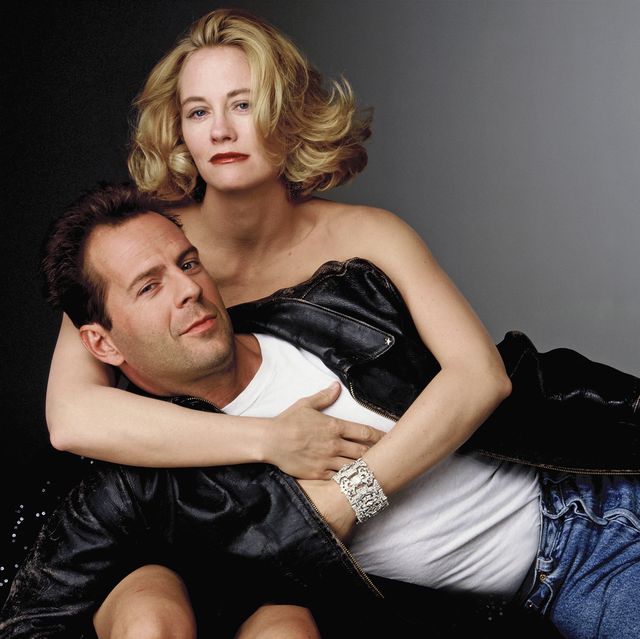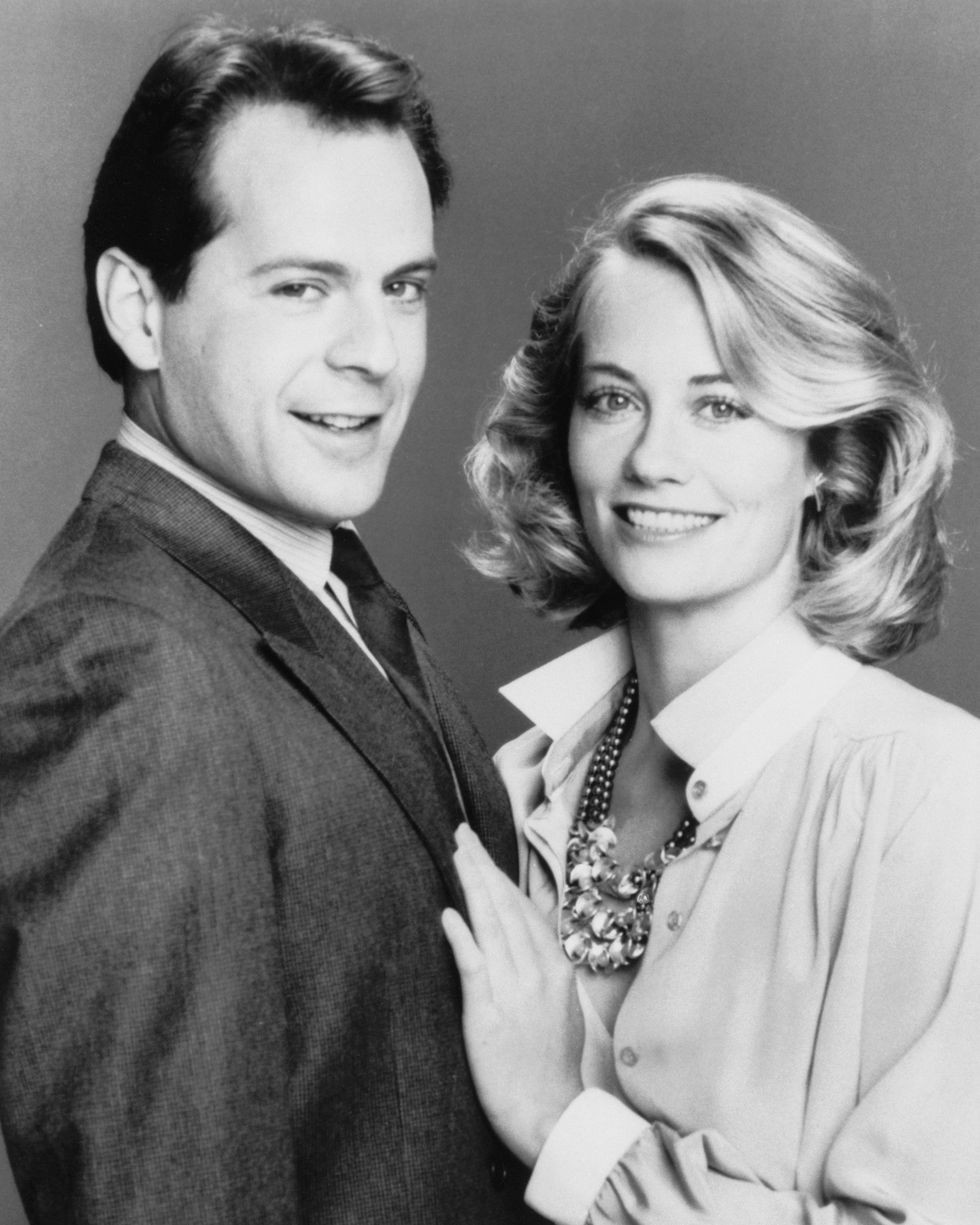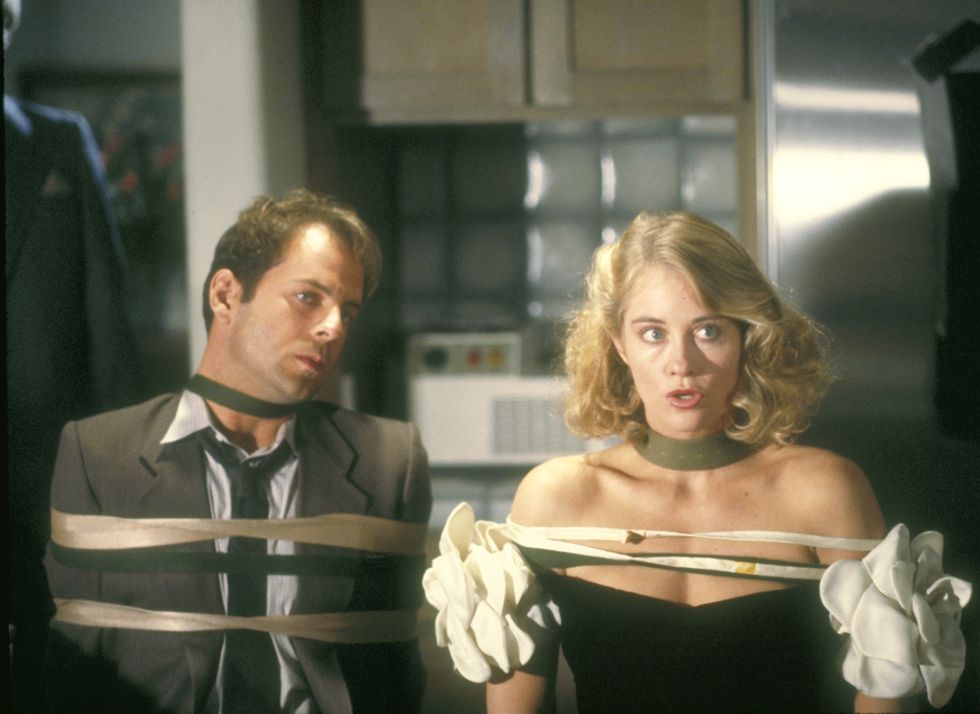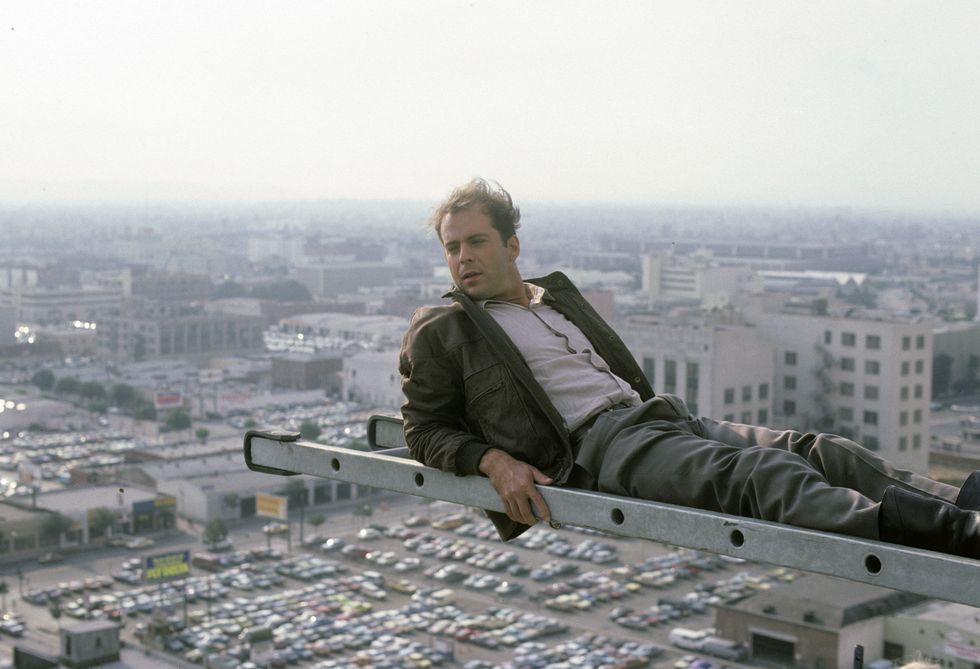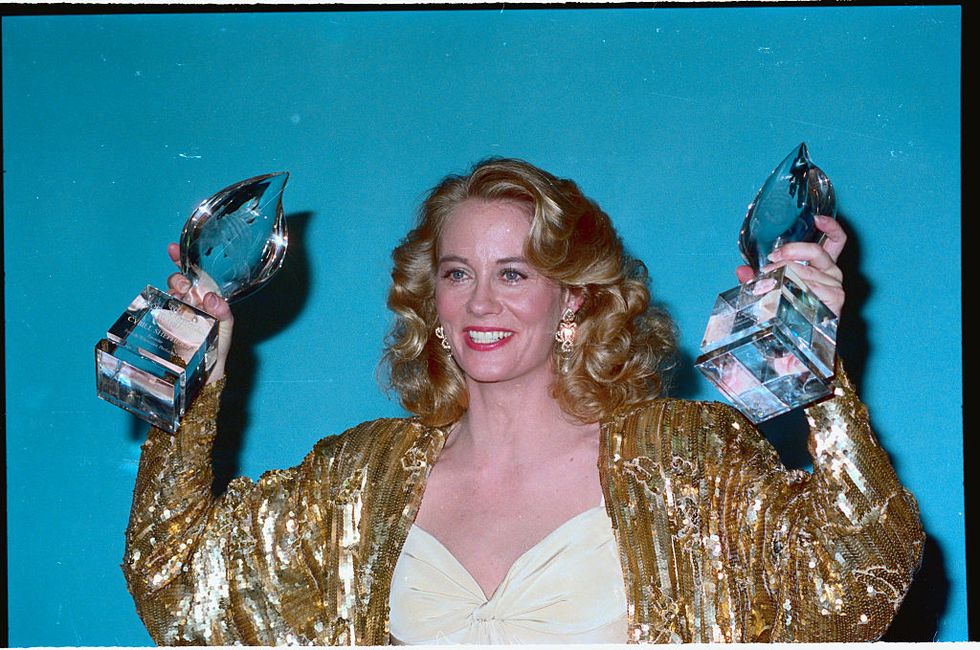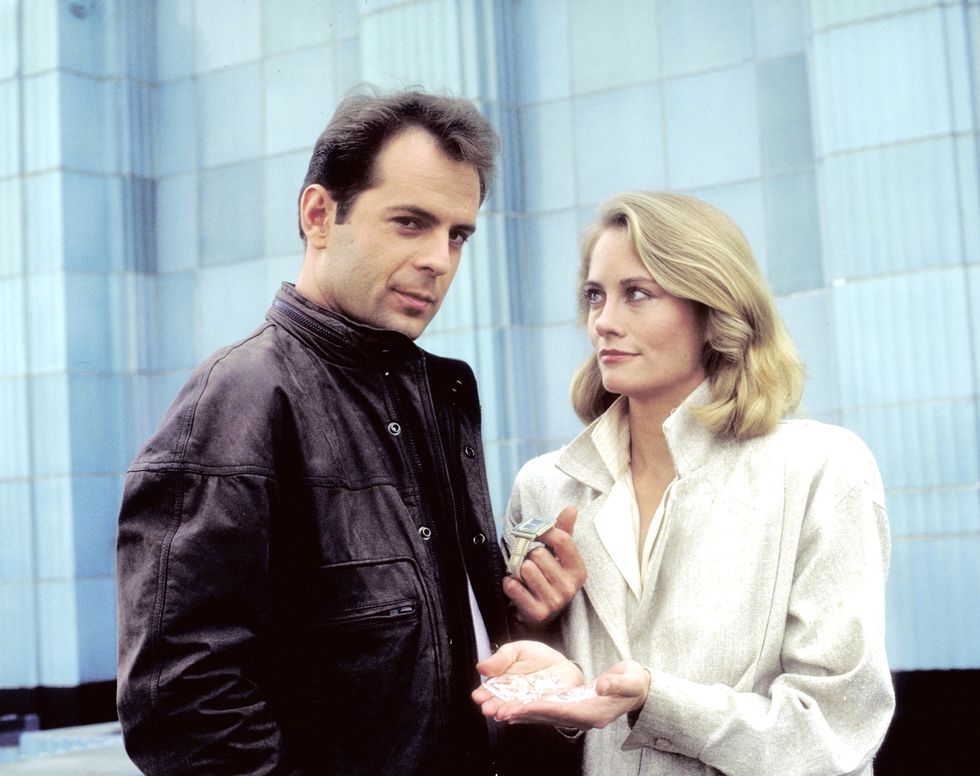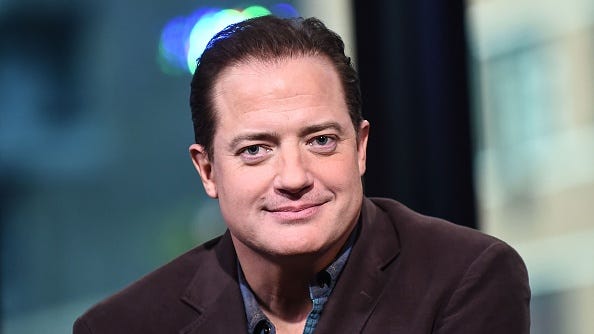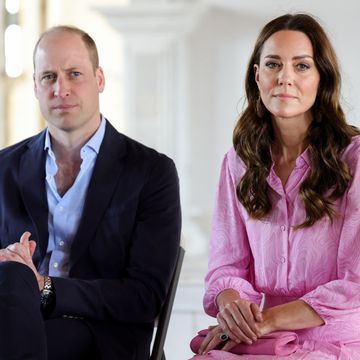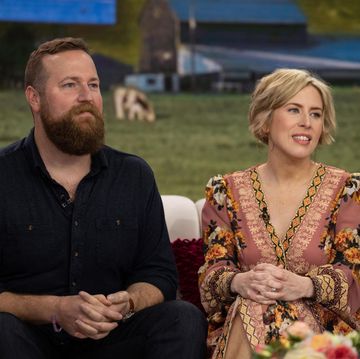To today's audiences, the premise of Moonlighting—the hit 1980s TV show recently released on Hulu—sounds vaguely like Schitt's Creek. Retired model Maddie Hayes (Cybill Shepherd) must say goodbye to luxurious living after her accountant embezzles her fortune. Her saving grace? One of her non-liquid assets: a money-losing detective agency, which was originally purchased as a tax write-off, helmed by the cocky David Addison (Bruce Willis).
Equal parts screwball comedy and drama, Moonlighting debuted on ABC's Tuesday night lineup in 1985 with a 2-hour high-production, action-packed premiere. After a modest start, it won over audiences and critics, garnering People's Choice awards for both stars and 41 Emmy nods (and six wins) in total over its five-season run.
The show marked Shepherd's comeback, put Willis on the map, and featured big-name cameos including the likes of Orson Welles, Billy Joel, and Whoopi Goldberg. But by 1989, ratings had plummeted and ABC pulled the plug after season five. So what happened? Because the show was so beloved and acclaimed, there are lots of opinions on this topic. We sleuthed and weighed the evidence against the potential culprits.
Suspect #1: Maddie and David got together… and everyone lost interest.
The TV show's demise is often attributed to season three, episode 14, when Maddie and David's relationship crosses the line into romance. When it aired, the episode drew 44 percent of the television audience, reported the Chicago Tribune—a major ratings feat—but after that, interest fizzled.
So strong is the belief that this episode led to the show's end that it has become known as the Moonlighting rule—the notion that "if you put two characters together, the show instantly dies," reported NPR in 2009, but the news outlet also challenged this explanation. Not only have other shows survived this rule (see The Office), but the Moonlighting storyline didn’t give the audience a chance to become invested in Maddie and David’s relationship. Instead, in season four, only six of 14 episodes featured scenes with the two together, and the plot went off the rails. Why? That leads us to…
Suspect #2: Cybill Shepherd's pregnancy with twins
During the production of season four, the star developed gestational diabetes and was forbidden to work during her third trimester. Even then, she went to the studio for some filming, she wrote in her autobiography Cybill Disobedience (2000).
The abrupt shift in the story (Maddie flees to Chicago) and the lack of screen time for Maddie and David's relationship were the show's way of working around the situation. As a result, her pregnancy is often cited as a contributing factor to Moonlighting's eventual cancellation, but that's not the whole picture.
Shepherd wrote that she felt there was a good way to work her real-life circumstance into the plot, but that the producers thought of it as a "thoughtless inconvenience." She also wrote of being shut out when she gave her opinion about what would make sense (specifically, she disagreed with Maddie’s marriage to a man she met on the train and wed three days later, which she felt was out of character).
Her pregnancy did give Willis an opening to film a little movie (you might have heard of it) called Die Hard. According to the Washington Post, he had previously turned down the role due to his contractual obligations to Moonlighting. But the pause in the show's production changed that. After that movie's smash success, a career as a big-time movie star beckoned. That didn't directly lead to the show's cancellation either, but it certainly shifted Willis's focus.
Suspect #3: Production was bananas, B-A-N-A-N-A-S.
Whether the hectic set was responsible for Moonlighting’s brilliance or its downfall is up for debate. What’s certain is that production was intense, exhausting, and always behind schedule.
A 1986 New York Times article titled “The Madcap Behind Moonlighting” gave a birds’-eye view of the creative process of executive producer and head writer Glenn Gordon Caron, who thrived on the rush of impending deadlines. Scripts were written—and rewritten—up until the last minute. Episodes took twice as long to wrap compared to other shows (12 to 14 days versus seven). And scripts were twice as long as normal because the dialogue was so fast paced.
Though the NYT piece heaped on the praise for this "madcap" method, later the cracks began to show. The grueling pace led to stress and exhaustion, according to Shepherd, and the chaos spilled over to the audience experience too. Viewers might tune in for a new episode only to be served up a rerun because the new episode wasn’t ready, reported the Chicago Tribune.
Delays also caused the number of episodes per season to fall short of the 22-episode norm at the time. That meant that after five years, the series was shy of the 100-episode standard for syndication, so the network couldn't capitalize fully on its investment.
Suspect #4: Drama behind the scenes tore the show apart.
The chapter devoted to Moonlighting in Shepherd’s book leaves no doubt: Tensions ran high between Shepherd and Caron, and the situation became untenable.
In Shepherd’s telling, her concerns about her character were often dismissed. And though she praised the quality of the show and agreed that the last-minute writing was “inspired and edgy,” she also wrote of “the kind of fatigue that depletes every resource including civility.”
As for Caron’s point of view? In a 2005 interview that coincided with the DVD release of the series, he said that Shepherd “didn't anticipate how difficult the show would be to do” and that she “was hoping for an easier gig.” He did not blame her entirely, though. He owned up to the 14- to 15-hour days and the unpredictability of production (“sometimes you'll start at noon and work until 3 a.m., other times you won't know when or where it will be [until the last minute.]”)
Ultimately, Caron left before the last season (accounts differ on whether this was at Shepherd’s behest or he quit), but it did not turn the show around. By the end, critics who once praised the series as innovative were panning it as gimmicky.
Even the script of the last episode of Moonlighting acknowledged the utter disarray into which the show had fallen. In the episode, the characters of Maddie and David arrive at the Blue Moon Detective Agency to find the set being taken apart by a crew and learn the show is cancelled. “Can you really blame the audience?” an off-camera producer asks them. “A case of poison ivy is more fun than watching you two lately.” Ouch.
Suspect #5: Don't forget the writers strike of 1988.
To top it all off, 1988 was the year of a Hollywood writers strike that stretched for 154 days (déjà vu 2023), delaying the start of the fifth season into December. In 2007, during another TV and film strike, the LA Times named Moonlighting as one of the 1988 strike's major casualties. Though it would be reaching to say it was the main cause for cancellation (today, that would be like saying the writers strike delayed the second half of season five of Yellowstone), it didn't help.
Suspect #6: ABC changed the time slot from Tuesday to Sunday night.
If there was a proverbial nail in the coffin, it might have been the network's call to move the show from Tuesday night—its time slot since the beginning—to Sunday night in the middle of season five.
Suspect #7: It was really expensive.
Moonlighting was one of the most expensive shows of the era, reportedly costing $1.6 million per episode. Because it was produced in-house, it was fully owned by ABC, so the network did not mind pouring money into the project initially in hopes of cashing in later. However, odds stacked up against the show as ratings dropped. It couldn't have helped that it was behind schedule on reaching the 100-episode threshold to syndicate.
Which of these suspects was the main culprit? Ultimately it was the ratings, of course, but discord on set, production delays caused by a host of reasons, questionable creative choices, and money all certainly played a part. Now that Moonlighting has a whole new audience on Hulu, this investigation is sure to be continued…

Terri Robertson is the Senior Editor, Digital, at Country Living, where she shares her lifelong love of homes, gardens, down-home cooking, and antiques.
